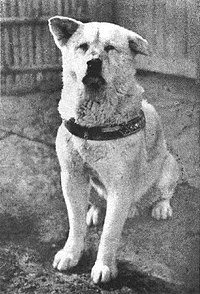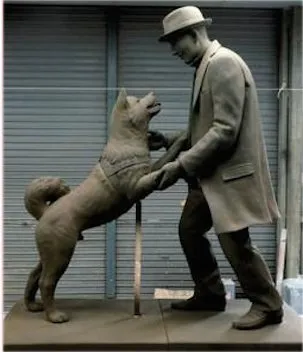Dogs are often referred to as "man's best friend" for a reason - they express unwavering loyalty toward those who they serve. Some experts claim that dogs' loyalty is instinctual, a personality trait borne from pack behavior and the association between allegiance and a dog's success. Others opine that dogs may perceive themselves, not as a distinct species, but as our equals. Whatever the reason for dogs' undying loyalty, in many instances humans can look to dogs, especially in today's culture of consumerism and self-centeredness, as a model for how we should treat one another.
Hachiko the Akita

Image Source: Wikipedia
Take, for example, this story posted on All That's Interesting by Gina Dimuro. Dimura tells of a Japanese professor named Eizaburo Ueno and his Akita, Hachiko. Living in Japan in the early 1920s, Professor Ueno and Hachiko followed the same routine every day: they walked to the train station in the morning, Professor Ueno boarded a train and went to work, then returned later in the day following his classes. And every day when the professor returned, always at 3 pm on the spot, he would find Hachiko patiently waiting for him. Every. Day.
Suddenly, though, Professor Ueno died of a stroke one day while teaching. Of course, Hachiko showed up at the normal 3pm rendevous that day, but his owner never arrived. Trusting his owner would come, Hachiko returned the next day, and the day after, and the day after that until days became weeks, weeks became months and months turned into years. Hachiko waited. Every. Single. Day.
One day a former student of Professor Ueno's learned of Hachiko's custom and published a newspaper article about the dog that transformed him into a national icon - a symbol of loyalty and fidelity. Soon people were traveling from all over the country to meet Hachiko. He was so dear to some that they eventualy erected a bronze statue in his honor. Hachiko continued his routine for over 9 years until he died of natural causes.

Image Source: Wikipedia
As heartbreaking as Hachiko's story may be, it highlights a few themes that we as a society could reference:
Commitment to an Ethos
The devotion Hachiko displayed toward his master represents loyalty at its utmost. I once heard that dogs are calm when their master leaves the house, because they have faith that he or she will return. Surely, Hachiko believed that his Professor Ueno would come back one day. However, as humans we can look to Hachiko as an example of allegiance to principle - making decisions not actuated by external factors but rather by an internal ethos - a drive to adhere to a set of values and principles.
Compassion and Community
The compassion and community displayed by the Japanese toward Hachiko in reverence of his loyalty personifies how we could all treat one another. They didn't need to console Hachiko and shower him with treats like they did. Even though his heart was surely broken by the disappearance of his master, his spirits must have been raised by the companionship. From volunteerism at local charities to online fundraising campaigns to saying hello to your neighbor to simply smiling at somebody being rude to you because they are having a bad day - there are opportunities to engender this sense of community through compassion everywhere around us.
It's this sense of community that that is crucial to human fulfillment. As Sebastian Junger notes in his book, "Tribe: On Homecoming and Belonging", early tribal societies were forged on a sense of community since the success of an individual was contingent on the success of the tribe. Early humans were nothing as individuals. Even though today's social and economic structures enable individual prosperity and the subsequent ability to dissociate from the tribe and society, many people are depressed or unhappy because they lack a sense of community and a connection to others. Junger provides many examples of this in his book. We can refer to the story of Hachiko as an illustration of the community building and the compassion towards others that we could foster as a society.
Thanks for reading! If you enjoyed this post enough to make it this far, please follow along @factotumk